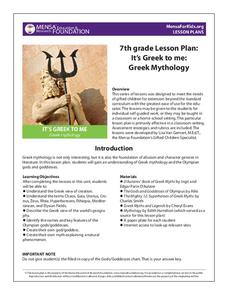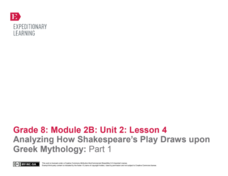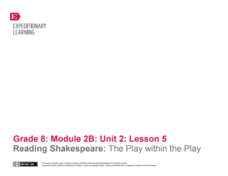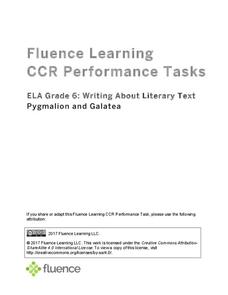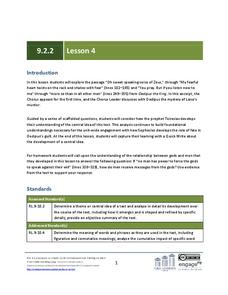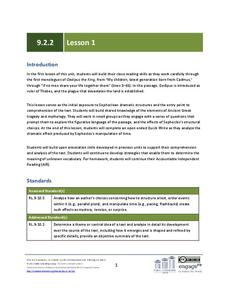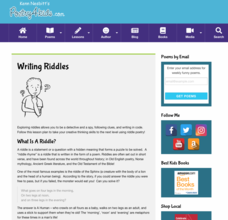MENSA Education & Research Foundation
It’s Greek to Me: Greek Mythology
It's no myth: this packet on Greek mythology is an excellent addition to your social studies curriculum. With writing activities, such as short answer responses and biopoems, and reading activities, which include creation stories and...
EngageNY
Analyzing How Shakespeare’s Play Draws upon Greek Mythology: Part 2
Pupils explore the narrative structure of a piece of literary text, mapping out the plot structure of the Greek myth "Pyramus and Thisbe." Next, they use their completed graphic organizers to write story summaries.
Prestwick House
Edith Hamilton’s Mythology
Where is the Oracle? Who brought fire from Olympus? What creature is half bird, half horse? Review details from famous Greek myths with a crossword puzzle that focuses on Edith Hamilton's Mythology.
Have Fun Teaching
Compare and Contrast Greek Myths (4)
How are Icarus and Prometheus similar? How are they different? Compare any two Greek myths with a graphic organizer, which provides space for kids to fill in the ways that the myths are like and unlike each other.
EngageNY
Analyzing How Shakespeare’s Play Draws upon Greek Mythology: Part 1
Scholars read the story "Pyramus and Thisbe," analyzing word choice, tone, and meaning. They then try to find the gist of the story and discuss how Shakespeare used the myth in his play A Midsummer Night's Dream.
EngageNY
Analyzing How Shakespeare’s Play Draws upon Greek Mythology: Part 3
How do the narrative and play versions of the myth "Pyramus and Thisbe" affect meaning? Scholars reread Act 5, Scene 1 from Shakespeare's A Midsummer Night's Dream and compare its structure to "Pyramus and Thisbe." Next, they use a...
EngageNY
Reading Shakespeare: The Play within the Play
Scholars continue reading the Greek myth "Pyramus and Thisbe," analyzing why it was written into Shakespeare's A Midsummer Night's Dream. Next, they complete a Venn diagram to compare the two texts.
Fluence Learning
Writing About Literary Text: Pygmalion and Galatea
Is it crazy to fall in love with your own work, or is that the purest love of all? Compare two renditions of the classic Greek myth Pygmalion and Galatea with a literary analysis exercise. After students compare the similarities and...
EngageNY
Reading Closely to Build Background Knowledge: “Myths and Legends”
That is a myth! Scholars take a look at Greek myths referenced in The Lightning Thief. As learners listen to stories in Myths and Legends, they imagine the sights and sounds described. Pupils then talk with partners about specific words...
EngageNY
Connecting Literary and Informational Texts: Cronus and “The Key Elements of Mythology”
Is there a connection? Scholars work to make connections between Myth of Cronus and The Key Elements of Mythology. First, they circle important words in the text and look for similarities. They then revisit the concept of theme and...
EngageNY
Leaving the Play: All’s Well That Ends Well
How does Shakespeare develop the theme of control in A Midsummer Night's Dream? Using the resource, scholars analyze the theme of parental control in the play and the Greek myth "Pyramus and Thisbe." Next, they talk to partners to...
EngageNY
Mid-Unit Assessment: Author’s Craft: Analyzing Shakespeare’s Craft: Part 2
Annoyed or bewitched—how does an author's word choice affect a text? Scholars begin the instructional activity by analyzing word choice in Shakespeare's A Midsummer Night's Dream. Next, learners take a closer look at the narrative...
EngageNY
Mid-Unit 2 Assessment: Analyzing Narrative Structure and Author’s Craft: Part 1
Using the resource, scholars complete a mid-unit assessment to gauge their learning at the halfway point of the unit. Pupils read the myth "The Harvest That Never Came" and plot its narrative structure.
Reed Novel Studies
The Lightning Thief: Novel Study
Maybe dark clouds do have a silver lining. Just when Percy from The Lightning Thief thought of his life as doomed, he learned that his father is a Greek god. Scholars work through activities as they read how his life took a drastic turn....
EngageNY
Grade 9 ELA Module 2, Unit 2, Lesson 4
The concept of sight, whether it's a lack of sight or abundant sight of the future, plays a vital role in Sophocle's Oedipus the King. Develop your ninth graders' literary vision with a lesson that connects the prophecy of Teiresias to...
Curated OER
The Lightning Thief: Vocabulary Strategy
Take an in-depth look into the vocabulary from the novel, Percy Jackson and the Olympians: The Lightning Thief by Rick Riordan. With a list of words to choose from, scholars discover the definition, origin, stories associated with the...
EngageNY
Grade 9 ELA Module 2, Unit 2, Lesson 1
Delve into the heart of dramatic dialogue with a unit focused on Oedipus the King by Sophocles. Having completed an online exploration about ancient Greece beforehand, ninth graders read the play's opening lines and analyze how...
Poetry4kids
Writing Riddles
What's got 60 eyes, 150 fingers, and an endless number of ideas? Your language arts class! Challenge young writers to come up with clever riddles with an online poetry lesson.
Prestwick House
Pygmalion
Mold the perfect review session with a crossword puzzle based on George Bernard Shaw's Pygmalion. As class members answer clues about Eliza Doolittle, Henry Higgins, and Colonel Pickering, they review key concepts from the play.
Education World
Every Day Edit - Aquarius, the Water Carrier
For this everyday editing learning exercise, learners correct grammatical mistakes in a short paragraph about the Greek myth of Aquarius. The errors range from capitalization, punctuation, spelling, and grammar.
Gottlieb
Kennings vs. Stock Epithets – A Quick Review
Bone-crusher. Troll-wife. Battle-sweat. Blood-worm. What study of Beowulf would be complete without offering readers of this Old English epic poem an opportunity to craft their own kennings and epithets? Provide individuals with a copy...
Reed Novel Studies
Ella Enchanted: Novel Study
Ella in Gail Carson Levine's Ella Enchanted receives the gift of obedience and must do what others tell her, but her strong personality struggles with this gift. Scholars review how Ella handles her fate by completing vocabulary...
Novelinks
The Lightning Thief: Problematic Situation Strategy
In the novel, Percy Jackson and the Olympians: The Lightning Thief by Rick Riordan, Percy is faced with a major decision. After reading, chapter 19, discuss the decision-making process Percy took, what he decided to do, and what your...
Spark Notes
Antigone by Jean Anouilh: Study Guide - Mini Essays
In this online interactive literature learning exercise, students respond to 10 short answer and essay questions about Jean Anouih's Antigone. Students may check some of their answers online.
Other popular searches
- Greek Mythology Art Lessons
- Greek Myth Art Projects
- Greek Myths Art Activity
- Language Arts Greek Mythology
- Greek Mythology Art Projects


